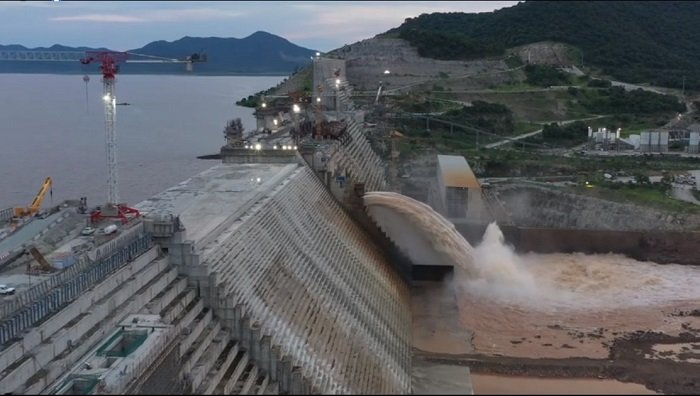www.aljazeerah.info
Opinion Editorials, July 2021
Archives
Mission & Name
Conflict Terminology
Editorials
Gaza Holocaust
Gulf War
Isdood
Islam
News
News Photos
Opinion Editorials
US Foreign Policy (Dr. El-Najjar's Articles)
www.aljazeerah.info
UNSC Insists on Negotiations Within the African Union to Resolve Differences About the Ethiopian Renaissance Dam By Hussein Haridy Al-Ahram Weekly , July 21, 2020 |
 |
 |
|
|
The Ethiopian Grand Renaissance Dam after the second phase of filling, July 19, 2021 |
UN diplomacy on the GERD
Last week’s meeting of the UN Security Council to discuss the situation regarding the Grand Ethiopian Renaissance Dam made clear the position of the international community
The UN Security Council convened on 8 July at the request of Egypt and Sudan to discuss the situation that has arisen in the Horn of Africa and the Nile Basin relating to differences among Egypt, Sudan and Ethiopia regarding the absence of a binding agreement on the filling and operations of the Grand Ethiopian Renaissance Dam (GERD).
This was the second time that Egypt has brought the matter of the dam before the council. The first time was last year, long before the second filling of the dam that began earlier this month without prior consultation with the two downstream countries of Egypt and Sudan.
In both cases, Egypt referred the matter to the council in the context of Chapter VI of the UN Charter entitled “The Pacific Settlement of Disputes.” This time the referral was made according to Article 35 of the Charter that stipulates that “Any Member of the United Nations may bring any dispute, or any situation of the nature referred to in Article 34, to the attention of the Security Council or of the General Assembly.”
For the record, Chapter 34 states that the “Security Council may investigate any dispute, or any situation which might lead to international friction or give rise to a dispute, in order to determine whether the continuance of the dispute or situation is likely to endanger the maintenance of international peace and security.”
Judging from the perspective of Article 34, it seems that the Security Council did not fulfil its duty as prescribed in Article 34 last Thursday. Undoubtedly, the continuation of the serious remaining differences among the three Nile River countries does constitute or give rise to a dispute or a “situation” “likely to endanger the maintenance of international peace and security.” In fact, the session on 8 July had the title of “Peace and Security in Africa.”
The Egyptian, Sudanese and Ethiopian delegations, the former two headed by their foreign ministers, the latter presided by its minister of irrigation, explained the positions of their respective countries. The Egyptian foreign minister warned that Cairo will protect its share of the Nile water by whatever means is necessary, emphasising, however, that the Egyptian government still hopes to resolve the differences with Ethiopia through negotiations. The Sudanese foreign minister proved combative when she said that Ethiopia wants to “weaponise” the Nile water and exercise “hegemony” over the sources of the Blue Nile.
As for the Ethiopians, the remarks of their irrigation minister were a rehash of their well-known position, often repeated over the last ten years, that runs counter to the facts on the ground. However, the remarks were mostly destined for Ethiopian public opinion rather than to debate the outstanding differences with the two downstream countries objectively and in a spirit of compromise.
The members of the Security Council insisted that negotiations are the best possible avenue for working out the differences among the three countries and expressed a preference for the African Union to keep pushing for a final agreement concerning the filling and the operations of the dam.
The Russian and French delegations spoke of their readiness to help the three countries reach a satisfactory resolution of their differences, and the Russian permanent representative talked about relations between Egypt and Sudan and other countries in the Nile River Basin. This is an interesting point that can be discussed between Egypt and Sudan in reviewing and reassessing the road covered so far and in comparing their respective readings of the Security Council session last Thursday.
Many Egyptian commentators lamented the fact that there was not enough support among the member countries of the Security Council for the Egyptian point of view. I believe that no one should be surprised by how the Thursday session on the Ethiopian Dam went, however. The session was significant, as well as important, in as much as it demonstrated where the international community stands on the issues at hand.
On 10 July, a US State Department spokesman made known the American position on the differences regarding the dam. This was a new American position that merits attention. The spokesman said that the United States does not countenance what he called the “military option” as an alternative to settling the “crisis” over the dam. He added that the best place to overcome the differences among the three parties was the African Union, adding that Africa does not need more wars. Whereas the US government stands ready to provide “political and technical assistance,” he said, this would be conditional on the “consent” of the parties concerned. Whether Ethiopia will consent to that remains an open question. I doubt that it will, to put things diplomatically.
I guess that the other four permanent members of the Security Council have similar positions to the one expressed by the spokesman of the US State Department. It now behooves us to draw the right conclusions from the remarks made at the Security Council on 8 July and plan our future steps accordingly.
*The writer is former Egyptian Assistant Foreign Minister.
UN diplomacy on the GERD - Opinion - Ahram Online
***
Share the link of this article with your facebook friends
|
|
|
|
||
|
||||||


